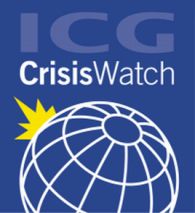International Crisis Group – A Ceasefire and Negocitations the Right Way to Resolve the Libya Crisis
INTERNATIONAL CRISIS GROUP – NEW MEDIA RELEASE
A Ceasefire and Negotiations the Right Way to Resolve the Libya Crisis
Brussels, 10 March 2011: A complete ceasefire to be followed by negotiations to secure a transition to a post-Qaddafi, legitimate and representative government should be the immediate objectives of the international community’s approach to the Libyan crisis. Military intervention should be viewed as a last resort, with the goal of protecting civilians at risk, and nothing should be allowed to preempt or preclude the urgent search for a political solution.
At the outset of the anti-Qaddafi protests, the international community reacted to widespread abuses against civilians by adopting measures (asset freeze, arms embargo, threat of prosecution of war crimes) which Crisis Group had called for and publicly supported as necessary to prevent a humanitarian disaster. But the situation has since evolved. It is now becoming a full-scale civil war.
In Tunisia and Egypt, the army, by playing a neutral buffer role, was decisive in avoiding civil war and facilitating an orderly resolution of the political crisis. In both countries, the state had an existence independent of the president and his regime, and the army could see that the protesters were opposing the latter but not the state itself. This distinction between state and regime is absent in Libya.
Qaddafi built a power structure centered around him and family members and dependent in part on tribal alliances rather than modern structures. As a result, the army and security forces could not remain neutral; they have split between forces loyal to one side or the other. The country also appears to be dividing along tribal and regional lines.
In this context, Western calls for military intervention of one kind or another are perilous and potentially counter-productive. There are no quick or easy fixes. Insisting that Qaddafi step down will not make it happen. Imposing a no-fly zone, bombing airfields or arming the rebels could tilt the balance of power in the rebels’ favour but is unlikely to swiftly bring down the regime.
In fact, it could hand the regime a propaganda gift that enables it to reinforce its position, while compromising and dividing the anti-Qaddafi coalition, which needs time to develop into a truly unified movement with a clear leadership and a coherent political vision. It might also prove inconclusive, placing the international community before a difficult dilemma: to deepen its involvement or witness a protracted stalemate.
Determined Western intervention could help topple the regime but at considerable political as well as human cost and would risk precipitating a political vacuum in which various forces engage in a potentially prolonged and violent struggle for supremacy before anything resembling a state and stable government are re-established. Such a vortex could draw in Libya’s neighbours and gravely compromise prospects for democratic development in Tunisia and Egypt as well as create a humanitarian catastrophe on Europe’s doorsteps. Entering the conflict likely would be far easier than exiting it.
Instead, the international community should enunciate clear principles aimed at ending loss of life and which it could defend regardless of the conflict’s evolution:
- Condemnation of the use of force against civilians and of violations of international humanitarian law, with the credible prospect of international action should such actions escalate
- An immediate ceasefire.
- Negotiations between the protagonists aimed at replacing the current regime with a more accountable, representative and law-abiding government. Both immediate humanitarian and longer term political considerations require an end to the violence through a cease-fire and negotiations between the two sides. Crisis Group accordingly calls for the formation of a contact group or committee consisting of internationally respected statesmen drawn from Libya’s North African neighbours and other African states. Its mandate would be to broker an immediate ceasefire and initiate direct talks between the two sides to secure a transition to a post-Qaddafi regime that has legitimacy in the eyes of the Libyan people.
Such talks might not succeed. More forceful measures — sanctioned by the UN Security Council and in close coordination with the Arab League and African Union — might become necessary to prevent massive loss of life. But before that conclusion is reached, diplomatic options must first be exhausted. They have not even begun.
Visit our website: http://www.crisisgroup.org
Andrew Stroehlein (Brussels) +32 (0) 2 536 0071
Kimberly Abbott (Washington) +1 202 785 1602
The International Crisis Group (Crisis Group) is an independent, non-profit, non-governmental organisation covering some 60 crisis-affected countries and territories across four continents, working through field-based analysis and high-level advocacy to prevent and resolve deadly conflict.

